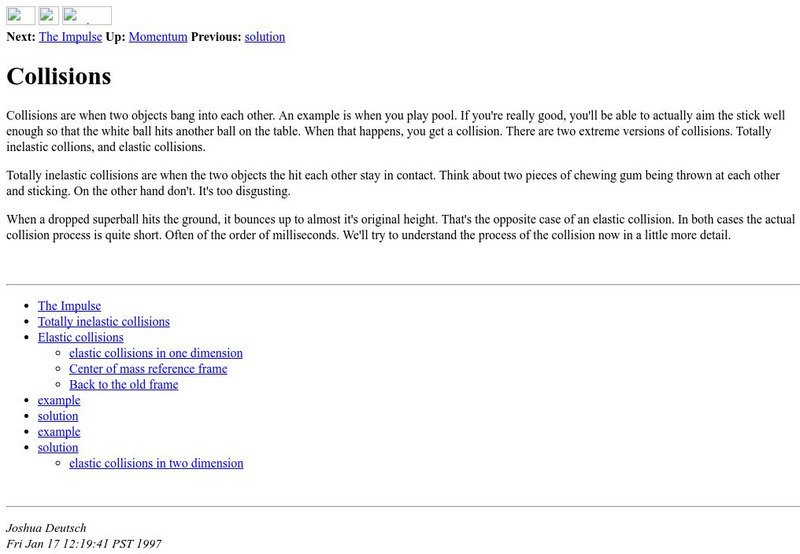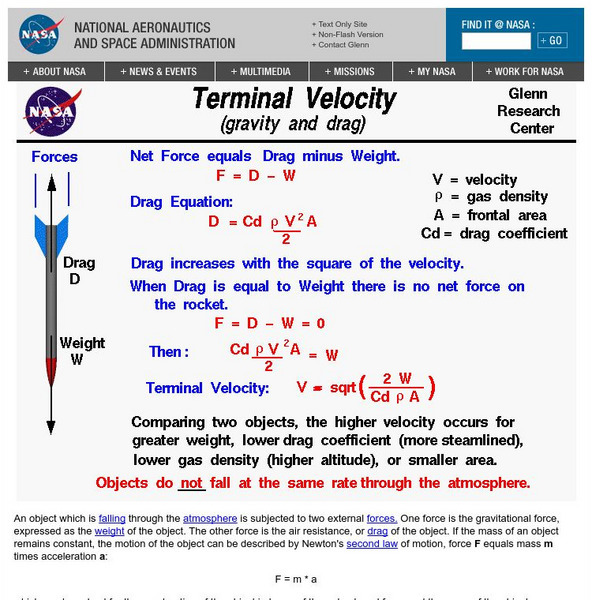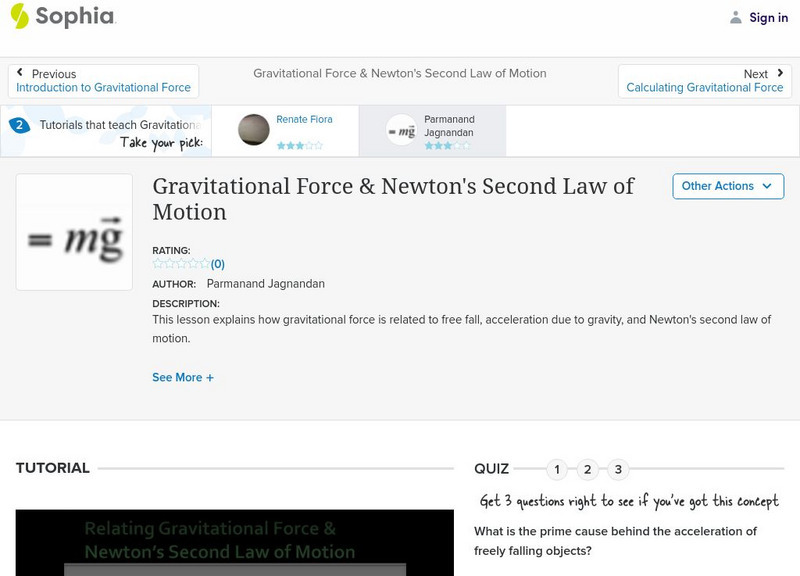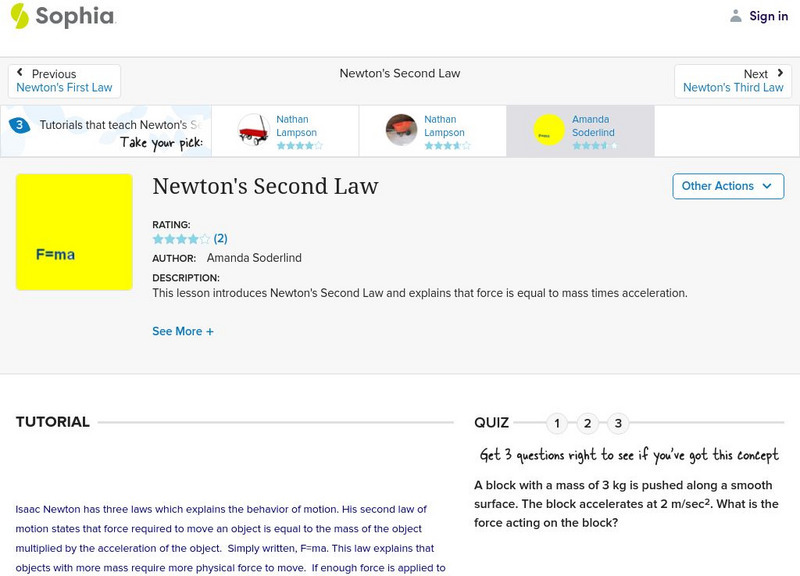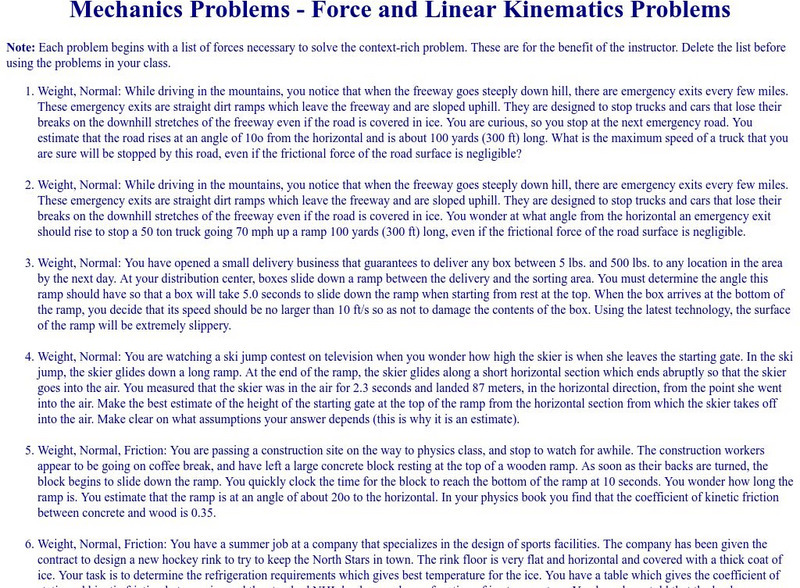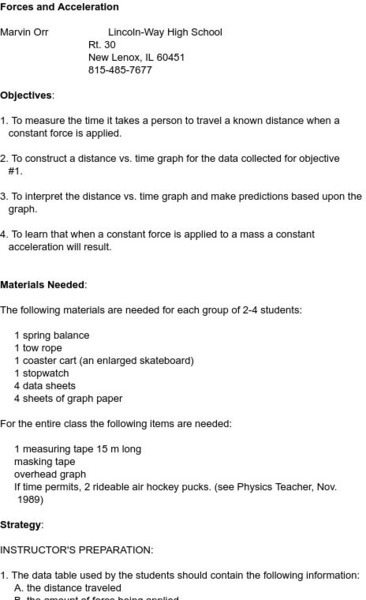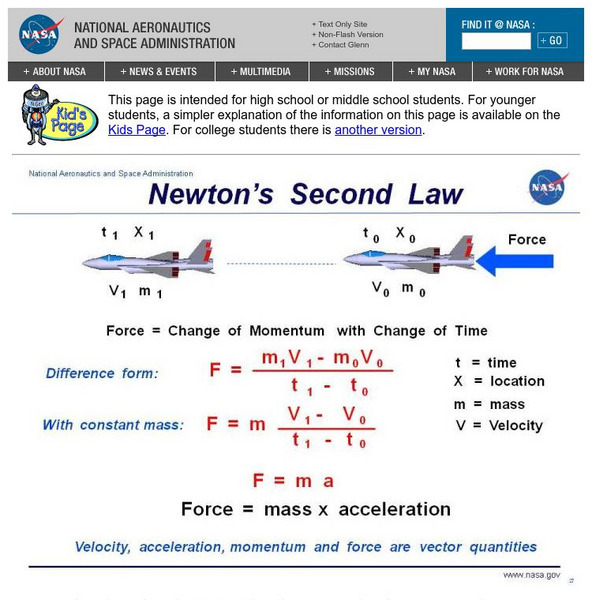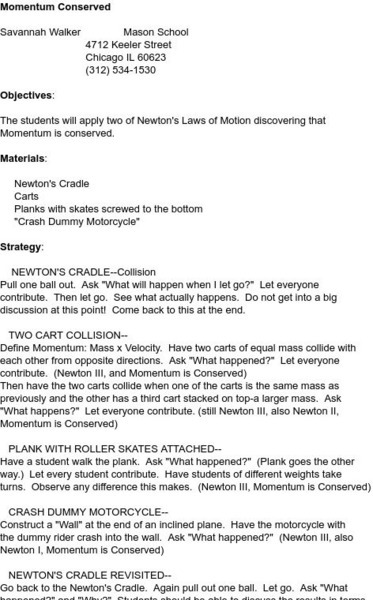NASA
Nasa: Vectors
This site from NASA provides an excellent tutorial on vectors and their use in physics to describe the motion of objects. Vector addition and resolution are illustrated.
NASA
Nasa: Beginner's Guide to Aerodynamics
Includes exhaustive information and a wealth of activities pertaining to aerodynamics and the physics of flight.
CK-12 Foundation
Ck 12: Physics Simulation: Hot Air Balloon
[Free Registration/Login Required] Learn about Newton's 2nd Law - the relationship between force, mass, and acceleration for a hot air balloon using this interactive simulation. A PDF worksheet and a video tutorial are also available....
CK-12 Foundation
Ck 12: Physics Simulation: First Law Simulation
[Free Registration/Login Required] In this simulation, students investigate the question of whether force is required to keep a sled moving on ice.
CK-12 Foundation
Ck 12: Physics: Newton's Laws Study Guide
This study guide on Newton's Laws covers key terms, the three laws, free body diagrams, friction coefficients and tension. Includes equations and an example problem with solution. It is available for download with free registration.
Khan Academy
Khan Academy: Inclined Planes Review
Review the key concepts and skills for inclined planes, including how to write Newton's second law for forces parallel and perpendicular to the incline.
Khan Academy
Khan Academy: Linear Momentum Review
Overview of key terms and equations for linear momentum, including a derivation of Newton's second law from the conservation of linear momentum.
MadSci Network
The Mad Scientist Network: Bouncing Rubber Ball
A question and answer format is used to relate elastic potential energy to the bounce of a rubber ball. Explanation of this simple phenomenon is thorough, complete, and free of trite statements.
Cosmo Learning
Cosmo Learning: Momentum & Collisions
Review momentum and collisions with this collection of video lectures from East Los Angeles College. Lectures vary in length and explain the concepts with examples.
Science and Mathematics Initiative for Learning Enhancement (SMILE)
Smile: Lab Activity: Aviation
This site from the Illinois Institute of Technology provides a student lab activity in which the flight of a paper airplane is investigated and studied. Designed for primary grades, but easily adaptable for junior high students.
PBS
Pbs: Nova: Top Gun Over Moscow
An online exhibit investigating the sensations experienced by a cockpit pilot in a Russian aircraft. Focuses on G-forces and apparent weightlessness.
Other
Uc Santa Cruz: Collisions
A physics definition of collisions with examples to illustrate the concept and related links to problems and solutions.
NASA
Nasa: Beginner's Guide to Aerodynamics
This site from NASA uses a colorful graphic to illustrate why objects reach terminal velocity. Provides equation for the terminal velocity of an object. Graphic is accompanied by a simple explanation.
Sophia Learning
Sophia: Gravitational Force & Newton's Second Law of Motion
This lesson explains how gravitational force is related to free fall, acceleration due to gravity, and Newton's second law of motion.
Sophia Learning
Sophia: Mass & Acceleration: Lesson 1
This lesson explains why mass and acceleration are inversely proportional. It is 1 of 2 in the series titled "Mass & Acceleration."
Sophia Learning
Sophia: Newton's Second Law: Lesson 2
This lesson introduces Newton's Second Law and explains that force is equal to mass times acceleration. It is 2 of 3 in the series titled "Newton's Second Law."
Sophia Learning
Sophia: Newton's Second Law: Lesson 1
This lesson introduces Newton's Second Law and explains that force is equal to mass times acceleration. It is 1 of 3 in the series titled "Newton's Second Law."
Sophia Learning
Sophia: Weight & Acceleration: Lesson 1
This lesson demonstrates how to use weight to determine the acceleration of an object. It is 1 of 2 in the series titled "Weight & Acceleration."
University of Virginia
Uva Physics: Using Vectors to Describe Motion
Background information on vectors and their use in describing motion in two dimensions. A comparison of Aristotle's and Galileo's perspectives on force and motion is given.
University of Minnesota
University of Minnesota: Mechanics Problems: Force and Linear Kinematics Problem
This University of Minnesota site provides a series of contextually rich problems pertaining to force, Newton's second law of motion, and linear kinematics.
Calculator Soup
Calculator Soup: Force Calculator
This calculator will find the missing variable in the physics equation for force (F = m * a), when two of the variables are known.
Science and Mathematics Initiative for Learning Enhancement (SMILE)
Smile: Lab Work Forces & Acceleration
The Illinois Institute of Technology provides this site. The site contains a graphing activity which illustrates that a constant force exerted upon an object results in constant acceleration. Rolling carts and stopwatches are used to...
NASA
Nasa: Beginner's Guide to Aerodynamics
This site from NASA provides a graphic depicting Newton's second law. Graphic is accompanied by an explanation. Part of a larger site with additional information on Newton's laws.
Science and Mathematics Initiative for Learning Enhancement (SMILE)
Smile: Momentum Conserved
This site by the Illinois Institute of Technology gives a Lab activity in which students use a variety of toys to discover Newton's second law and momentum conservation. Newton's cradle, skate boards, and a toy motorcycle are incoporated...








